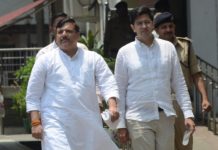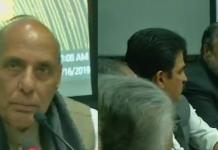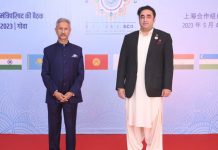
Shocking though it is and perhaps unfair, too, the allegation that Congress party leader Ajit Jogi may be complicit in last Saturday’s Maoist massacre in Chhattisgarh of 25 people, including several Congress leaders, has already been a whisper for days. The allegation came out in the open on Thursday when a top leader of the Bharatiya Janata Party (BJP) in neighbouring Madhya Pradesh reportedly said at an internal party meeting that former chief minister Jogi was “apparently” a part of the “conspiracy”.
In fact, at the funeral of Congress state president Nand Kumar Patel two days after the massacre, a few angry supporters of his reportedly raised slogans against Jogi before they were quickly hushed down. That it happened in the presence of Congress vice-president Rahul Gandhi rattled the party leadership. Jogi had skipped the funeral.
Jogi was not in the dragging motorcade of the Congress leaders that the Maoists ambushed, bombed and fired at on 25 May in a hilly region 35 km south of Jagdalpur town. Incapacitated in an accident nine years ago, wheelchair-bound Jogi took a helicopter to the public meeting that several Congress leaders had attended hours previously.
The others who had traveled by cars included, besides Patel, Mahendra Karma, a legislator and a bête noire of the Maoists since 2005 when he had created an anti-Maoist militia named Salwa Judum at the behest of the state government. The rebels singled out both Patel and Karma by name and pumped them with bullets on Saturday. In a statement that it issued later, the outlawed Communist Party of India (Maoist), to which the rebels belong, said it killed the two leaders to avenge the excesses of the Salwa Judum and Operation Green Hunt, a counter-insurgency operation launched in 2009.
Doubtless the allegations against Jogi cannot be based on any evidence as the National Investigative Agency (NIA) has barely begun its probe. But Congress insiders, admittedly hostile to Jogi, base their suspicion on three factors:
- Once close allies, Jogi and Patel had lately become political foes so much so that Jogi had openly held anti-Patel public meetings in the latter’s native region;
- Jogi is believed to have a line of communication with the rebels; and
- Patel had no involvement in the counter-insurgency and had, in fact, been critical of the government’s policies towards the Maoist problem. Yet, the rebels targeted him.
The whisper campaign took wings when BJP leader Narendra Singh Tomar of Madhya Pradesh made the allegation against Joshi and Ananth Kumar, a Rajya Sabha MP from the BJP, reportedly repeated the claim. Talking to TEHELKA correspondent Anil Mishra in Raipur, Jogi slammed the allegations against him, calling them “absurd”.
“I have already initiated criminal proceedings against both Tomar and Ananth Kumar for their baseless allegations,” Jogi told TEHELKA. Jogi said that the charge that the route of the motorcade was changed at the last minute, as is being said, cannot be laid at his door, as it was Patel himself who had done so and even so, the police had been informed of it. Another local Congress leader who is a Jogi loyalist pointed out to TEHELKA that the Maoists had already said they targeted Patel because he refused to heed their warning against organising public meetings in the tribal areas.
It is true though that the Maoists rarely target top politicians, using their firepower instead on security personnel, both the police and the paramilitary Central Reserve Police Force (CRPF). The biggest politician they have yet attacked was the then Andhra Pradesh Chief Minister N. Chandrababu Naidu in October 2003. He had survived. Four years later, they had killed former Jharkhand Chief Minister Babulal Marandi’s son.
So why kill Patel? A farmer’s son who wound his way up like a creeper as ambitious politicians do everywhere, just what made Patel a high value target for the rebels? And why kill his son, too? That the rebels wanted to kill Patel and his son is undoubted because they spared many others. (TEHELKA correspondent Mishra reported on Thursday that a legislator who was with Patel tried to reason with the rebels telling them that Patel was sympathetic to their cause. Yet, they asked him to run or risk being killed, too.) Indeed, after the ambush, the rebels gave some of the survivors water to drink and bandaged the wounds of a couple of people they had shot. In the statement the CPI(Maoist) issued later, it apologised for the deaths of those besides Patel and Karma.
Chronicle Of A Tragedy Not Foretold
Jogi is in the whisper campaign now because most of the politicians in the motorcade were his factional rivals in the Congress. They include former union minister Vidya Charan Shukla, 84, who received three bullets and is lying critical in a hospital near New Delhi. Jogi’s rivalry with Shukla goes back to November 2000 when Chhattisgarh was carved out of the adjoining Madhya Pradesh as a separate state. Transferred from Madhya Pradesh to Chhattisgarh, the Congress legislators held a majority in the newly minted state assembly and Shukla had expected to become its chief minister.
However, at the last minute, Jogi trumped Shukla and became the chief minister although a majority of the legislators backed Shukla. In the factional Congress contest, Shukla and the others have mostly been a proxy for Congress general secretary Digvijay Singh, a former chief minister of Madhya Pradesh who gives Jogi no quarter. Singh has smarted from the humiliation he faced at Shukla’s house when Shukla’s supporters manhandled him after Jogi was named chief minister.
Patel was once a Singh groupie and held various portfolios, including the home ministry, in Madhya Pradesh when Singh was chief minister from 1993 to 2003. Patel switched sides when Jogi became Chhattisgarh chief minister in 2000 and was made home minister, a position he held until the BJP won the 2003 Chhattisgarh assembly elections.
Many in the party have blamed Jogi for the successive Congress defeats in the assembly elections of 2003 and 2008. They claim the Hindu upper caste electorate in Chhattisgarh rejects the Congress party because Jogi is a Christian and a tribal. “Many die-hard Congress supporters have moved to the BJP as they distrust Jogi,” a Congress operative in Raipur told TEHELKA on the phone. With state assembly elections due in Chhattisgarh in December, Singh and the other Congress leaders have been urging party president Sonia Gandhi and Rahul Gandhi to sideline Jogi or trim his role.
Opponents say Jogi has continued to hold sway in the party’s Chhattisgarh wing due to an unflinching backing by the Congress president, although her son is not so warm to him. Sensing Jogi’s isolation, Patel had switched back to Singh’s camp a few years ago. That coldness stiffened when Patel was made the party chief in the state in 2011. Insiders say Patel fancied his chance to become chief minister in case the Congress won the forthcoming assembly elections. Jogi could accept Patel as chief minister only at his peril. In any case, Jogi wants his wife, Renu, who is a legislator, to be a contender in the race to be chief minister should the Congress pull off a victory in December.
Patel, a non-tribal belonging to Other Backward Castes (OBC), has traditionally delivered wholesale votes to the Congress in and around his native village in Raigarh district in north Chhattisgarh. He first shot to notice in 1988 when, while only a sarpanch, he secured nearly all the 2,000 votes in his village for Congress leader Arjun Singh, who had contested a by-election to the assembly from a seat in Raigarh.
Arjun Singh was so impressed with Patel that in the 1990 assembly elections Patel got the Congress ticket from the same constituency, sidelining a former long-serving stalwart legislator who had graciously vacated his seat for Arjun Singh’s by-election just two years earlier. Patel won that election and became a minister three years later.
Congress insiders say that despite his meteoric rise, Patel was never a strongman for the simple reason that his caste brethren, who are traditionally milk producers, are limited to only three assembly constituencies in Raigarh. That is why he always needed to hitch his wagon to either Digvijay Singh or to Jogi to punch above his weight.
“Patel would never be caught openly siding with one or the other,” the insider in Raipur says. “He took care never to be seen as opposing or supporting one view or the other.”
Perhaps a fatal flaw, one that confused the Maoists about where his politics lay.
ajit@tehelka.com













